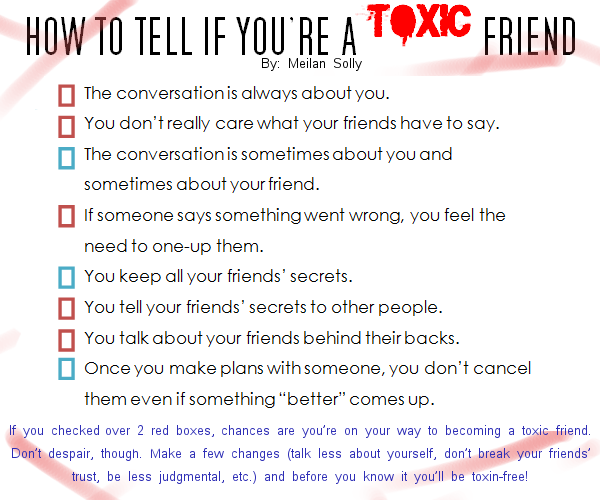By: Meilan Solly
Have you ever talked about a friend behind their back? Can anyone honestly say they haven’t? Saying bad things about your best friends when they’re not there isn’t exactly one of the Seven Deadly Sins, but it is a definite step towards becoming a toxic friend. According to three freshmen – Emilly Grueso, Jordan Stinger, and Taylor Hover – toxic friends are backstabbers. They tell other people’s secrets, and they’re “two-faced and judgmental.” Liam Marshall-Brown, a senior, defines a toxic friend as “someone you think you can trust who goes behind your back.”
According to a Today.com article entitled “Toxic Friends? 8 in 10 people endure poisonous pals,” 84% of women and 75% of men have had toxic friends. This idea is supported by Stinger, who says, “Most friendships are [toxic].” Various types of bad friends include the “narcissist,” who is self-obsessed; the “chronic downer,” who’s always depressing; and the “underminer,” who treats other people’s problems or accomplishments like they’re nothing. Friends who possess these characteristics negatively impact relationships because, according to Psychology Today, “they take and you give, [and] they consistently disappoint you.”
The difference between toxic friendships in men and women might seem small if one looks at statistics, but Mark Armstrong, a junior, says, “Guys’ friendships are about sports and similar activities, whereas girls’ friendships are more about feelings.” David Frederick, a professor of psychology at the University of Hawaii, expands on the idea, explaining that “women’s friendships tend to be more about intimacy…the downside is that leaves them more open to attack.”
If toxic friendships are so very horrible, why do people continue them? Friends are, according to Marshall-Brown, people “you can trust and enjoy being around,” and toxic friends obviously don’t fit those requirements. However, according to Today.com, 83% of people stay in toxic relationships simply because it’s hard to end a friendship. Grueso adds that “even if [a friendship] is toxic, [people] still think they’re friends.” Stinger says that if your toxic friend also happens to be your best friend, ending the relationship can leave you friendless.
Toxic friends have been around for a long time, and it’s likely they’re here to stay, especially with technology keeping everyone connected 24/7. This doesn’t mean, though, that once you’re in a toxic relationship you’re stuck. “Talk it out first, and if it doesn’t work then stop being friends,” Stinger advises. Another way of handling a toxic friendship is best explained by journalist David Hochman, who says, “I stopped focusing on the toxic part of the relationship and started focusing on what’s good. Now we just play tennis together and it’s working.”






